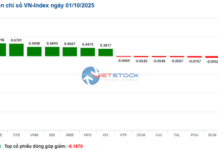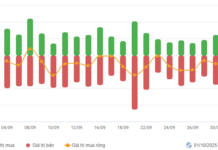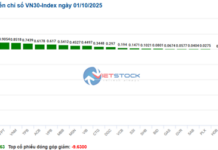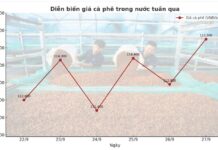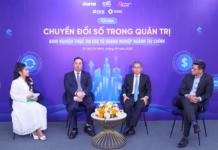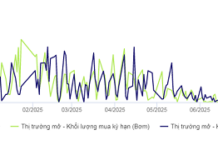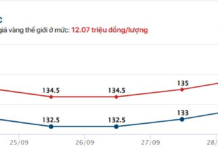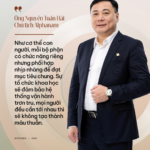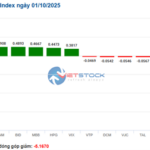At the seminar titled “Digital Transformation in Governance: Implementing ESG Practices from Financial Enterprises” held on the morning of September 30, 2025, experts shared insights on the current state, challenges, and future of digital transformation within Vietnam’s financial enterprises.
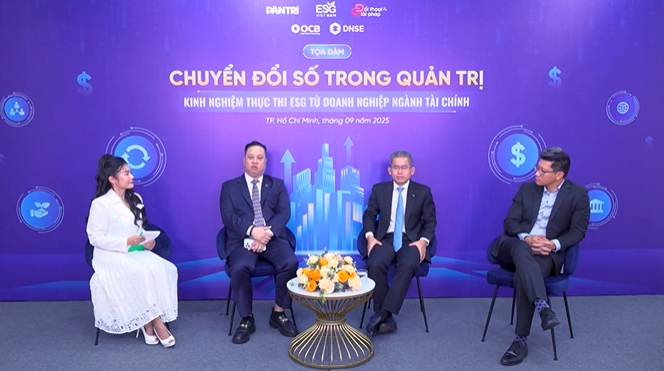
Speakers sharing insights at the seminar on September 30, 2025. Screenshot.
|
Full Digital Transformation in Approximately 3 Years
According to Mr. Nguyen Duc Trung, Principal of Ho Chi Minh City Banking University, digital transformation in the financial and banking sector is no longer just about developing a mobile app. It has permeated every aspect, reshaping the entire operations of enterprises across four key dimensions.
First, Distribution Channels and Customer Experience. Technology has revolutionized how financial institutions interact with customers. Innovations like eKYC enable remote account opening. Super Apps integrate services such as payments, shopping, and flight bookings, turning smartphones into all-in-one transaction hubs. Notably, banks have successfully implemented Omni-channel models, ensuring seamless and synchronized customer experiences across touchpoints like ATMs, Mobile Banking, Internet Banking, and physical branches.
Second, Products and Services. Digital transformation has birthed groundbreaking products. Digital Lending leverages Big Data for near-instant loan decisions. Digital savings and insurance products are gaining traction. Most impressively, cashless payments have surged, driven by QR codes and the NAPAS system, simplifying transactions.
Third, Internal Operations and Processes. Many banks have adopted Robotic Process Automation (RPA) to streamline repetitive tasks like initial loan processing and transaction reconciliation, reducing errors and saving resources. Data-Driven Decision Making, once aspirational, is now a reality, enabling sharper business strategies.
Fourth, Culture and Core Capabilities. Digital transformation is a top priority for leaders, fostering agile corporate cultures ready to adapt and innovate. Organizations are also investing heavily in cybersecurity to protect critical digital assets.
Mr. Trung categorizes Vietnamese financial enterprises into three groups based on their digital transformation progress:
First, the Pioneers: Foreign banks and some domestic banks that have long prioritized technology, investing heavily 5-7 years ago and now leading the market.
Second, the Accelerators: Large institutions leveraging scale, vast customer bases, and financial strength. They are investing aggressively in technology but sometimes struggle with legacy core banking systems.
Third, the Newcomers: Enterprises with strong digital transformation awareness but limited resources. They adopt tailored approaches, prioritizing key areas to catch up.
“Vietnam is one of the most dynamic countries in digital transformation. I believe within three years, we will achieve full digital transformation, not just in front-office operations but also in core back-office processes, creating fully automated ‘dark banks’ operated by robots,” Mr. Trung optimistically predicts.
Real-World Insights from Banks and Enterprises
Mr. Pham Hong Hai, CEO of Orient Commercial Joint Stock Bank (HOSE: OCB), shared that OCB started as a small-scale bank. To differentiate and compete, leadership identified speed as the key driver, with digital transformation as the solution.
Since 2018, OCB has launched OCB OMNI, integrating cutting-edge technologies like AI to personalize user experiences. Liobank, a fully digital bank, offers 100% digitized processes, even using facial recognition for credit scoring.
A standout initiative is the Open API solution, directly connecting OCB’s systems to enterprise management software. This enables businesses to execute financial transactions within their own systems, bypassing intermediaries—particularly beneficial for retailers needing instant payment confirmations.
As a result, Open API transaction values surged by over 200%. The CASA ratio (non-term deposits), a key metric for reducing funding costs, grew by more than 30%, placing OCB among the top 10 banks with the highest CASA ratios.
“For us, digital transformation and sustainable development (ESG) are the two core strategic pillars. It’s a matter of survival,” Mr. Hai emphasized.
Meanwhile, Mr. Tuan Nhan, CEO of Vietcap Securities Corporation, noted that in Vietnam’s fast-paced market, digital transformation is not optional.
It has enabled Vietcap to achieve economies of scale, adapt to new processes and products, and reduce new product launch times from six months to just 1-2 weeks. Big Data analytics tailor products and services to individual customer behaviors, creating a “bespoke” approach.
Technology allows Vietcap to continuously innovate, particularly with AI applications in analysis and trading.
Barriers and Recommendations for Digital Transformation
Despite its successes, the digital transformation journey is fraught with challenges. Experts highlight the biggest hurdles faced by all enterprises.
People and mindset are the greatest challenges. A lack of alignment between business and technology often results in products that fail to meet real needs. Resistance to change makes building a culture of experimentation incredibly difficult.
There is also a shortage of interdisciplinary talent—professionals skilled in finance, banking, IT, and mathematics—essential for developing true AI applications.
Experts commend the government and the State Bank of Vietnam (SBV) for their support and offer recommendations to enhance digital transformation:
Centralized Data Sharing: Mechanisms are needed for banks to access (with user consent) centralized data on national platforms like VNEID. This would improve credit assessments, reduce bad debt, and lower lending rates.
Clarify Support Policies: Detailed guidelines are required for preferential credit packages (e.g., the 500 trillion VND package) for high-tech and digitally transforming enterprises.
Expand Tax Incentives: Consider including digital transformation activities in R&D tax benefits.
Establish a National Support Center: A central agency is needed to advise, guide, and provide resources for enterprises undergoing digital transformation.
Integrate Early Education: To prepare for the future, integrate programming, AI, hardware, and software courses into primary and secondary education curricula.
In conclusion, digital transformation is a challenging but imperative journey for Vietnamese financial enterprises. With determination from businesses and robust policy support, Vietnam’s financial sector is poised for significant advancements, creating greater value for customers and society.
– 11:47 30/09/2025
Sunshine Group Surges to No. 2 Market Position, Behind Only Vinhomes, Projecting Q3 Profits of Nearly VND 1.5 Trillion and Targeting Annual Earnings of VND 14 Trillion
Following the successful merger with Sunshine Homes, Sunshine Group has not only secured its position as the second-largest player in the real estate market, trailing only behind Vinhomes, but has also made significant strides toward achieving its ambitious goal of an 18-fold increase in profit by 2025.
“Chairman Nguyen Tuan Hai of Alphanam: The Right Person for the Right Job – A Human Resource Philosophy Empowering Gen X, Y, and Z to Learn and Lead”
At Alphanam, there is no generational divide—only a harmonious synergy. Guided by the philosophy of “choosing the right people and assigning the right tasks,” the corporation seamlessly blends youthful energy with seasoned expertise, ensuring both innovation and stability.
Billionaire Nguyen Thi Phuong Thao’s Ecosystem Enters the Crypto Asset Platform Race, Targeting $420 Million in Charter Capital
A groundbreaking new entity in the cryptocurrency exchange sector has emerged, backed by HD Securities and key players within the Sovico Group ecosystem. This development follows HD Securities’ recent announcement of a plan to raise over 7.3 trillion VND, with a significant portion earmarked for investment in this innovative field.

